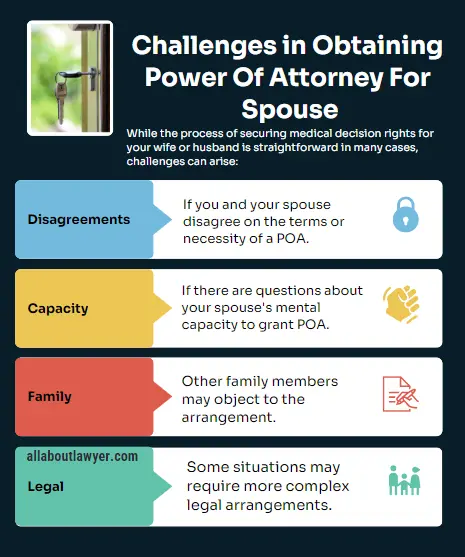How to Get Power of Attorney for Your Spouse?
Obtaining legal authority for your partner is a crucial step in ensuring that you can make important decisions on their behalf if they become incapacitated or unable to do so themselves. This comprehensive guide will walk you through how to get power of attorney for your spouse and process of securing decision-making rights for your spouse, covering everything from the basics of power of attorney to the specific steps involved in acquiring this legal capacity.
Table of Contents
Understanding Power of Attorney For Spouse
Before delving into the process of gaining legal control for your husband or wife, it’s essential to understand what power of attorney entails. Power of attorney (POA) is a legal document that grants one person (the agent or attorney-in-fact) the authority to act on behalf of another person (the principal). In the context of marital relationships, this typically involves one spouse granting legal authority to the other.
There are several types of power of attorney, including:
2. Limited or Special Power of Attorney
4. Springing Power of Attorney
Each type serves different purposes and comes into effect under various circumstances. When considering spousal legal representation, many couples opt for a durable power of attorney, which remains in effect even if the principal becomes incapacitated.
Related Articles For You:
Is Conservatorship the Same as Power of Attorney?
What is Reasonable Compensation for a Power of Attorney?
Why Obtain Power of Attorney for Your Spouse?
There are several reasons why securing decision-making rights for your wife or husband is important:
1. Medical Emergencies:
A healthcare proxy allows you to make medical decisions if your spouse is unable to do so.
2. Financial Management:
Spouse’s financial power of attorney enables you to manage assets and financial affairs.
3. Legal Matters:
You can handle legal issues on behalf of your incapacitated partner.
4. Long-term Care Planning:
It facilitates making decisions about long-term care arrangements.
5. Peace of Mind:
Knowing that you can legally act on your spouse’s behalf provides peace of mind for both partners.

Steps to Obtain Power of Attorney for Your Spouse
1. Discuss with Your Spouse
The first step in procuring legal representation for your partner is to have an open and honest discussion about the need for power of attorney. This conversation should cover:
– The reasons for establishing spousal legal agency
– The types of decisions that may need to be made
– Any specific wishes or preferences your spouse has
2. Determine the Type of Power of Attorney Needed
Based on your discussion, decide which type of power of attorney best suits your needs. Consider factors such as:
– The scope of authority required (general vs. limited)
– Whether the power should be durable (remains in effect if your spouse becomes incapacitated)
– If it should be springing (only comes into effect under specific circumstances)
3. Consult with a Legal Professional
While it’s possible to create a power of attorney document without legal assistance, consulting with an attorney can ensure that the document is legally sound and comprehensive. An attorney can:
– Advise on the best type of POA for your situation
– Ensure compliance with state laws
– Help draft a document that accurately reflects your spouse’s wishes
4. Draft the Power of Attorney Document
Whether you’re working with an attorney or using a template, the POA document should clearly state:
– The name of the principal (your spouse)
– Your name as the appointed agent
– The specific powers being granted
– Any limitations or restrictions on those powers
– Whether the power is durable
– The effective date and duration of the POA
5. Review and Refine the Document
Carefully review the drafted document with your spouse to ensure it accurately reflects their wishes and covers all necessary aspects of decision-making authority.
6. Formalize the Document
To make the power of attorney legally binding, it must be properly executed. This typically involves:
– Your spouse signing the document
– Having the document notarized
– In some states, having witnesses present for the signing
7. Store and Distribute Copies
Once the document is formalized:
– Keep the original in a safe place
– Provide copies to relevant parties (e.g., doctors, financial institutions)
– Consider registering the document with your state’s registry if available
Special Considerations for Spousal Power of Attorney
When obtaining legal guardianship for your partner, keep these points in mind:
1. State Laws: Matrimonial legal authority laws can vary by state. Ensure your document complies with local regulations.
2. Capacity: Your spouse must be of sound mind when granting power of attorney.
3. Potential Conflicts: Consider potential conflicts of interest, especially in financial matters.
4. Revocation: Discuss the circumstances under which the POA might be revoked or amended.
5. Regular Reviews: Plan to review and update the document periodically to ensure it remains relevant.
Challenges in Obtaining Power Of Attorney For Spouse

While the process of securing medical decision rights for your wife or husband is straightforward in many cases, challenges can arise:
1. Disagreements: If you and your spouse disagree on the terms or necessity of a POA.
2. Capacity Issues: If there are questions about your spouse’s mental capacity to grant POA.
3. Family Objections: Other family members may object to the arrangement.
4. Legal Complexities: Some situations may require more complex legal arrangements.
In these cases, seeking professional legal advice is crucial to navigate the complexities and ensure a valid and enforceable POA.
Alternatives to Power of Attorney
In some cases, alternatives to traditional power of attorney might be more appropriate:
1. Joint Ownership: For financial matters, joint ownership of assets can provide access without a formal POA.
2. Healthcare Proxy: A separate document specifically for medical decisions.
3. Living Trust: Can provide both asset management and incapacity planning.
4. Conservatorship: A court-appointed arrangement for managing the affairs of an incapacitated person.
Maintaining and Using Spousal Power of Attorney
Once you’ve successfully acquired legal control for your spouse, it’s important to understand how to maintain and properly use this authority:
1. Keep Records: Maintain detailed records of all actions taken under the POA.
2. Act in Best Interests: Always act in your spouse’s best interests and according to their known wishes.
3. Stay Within Scope: Only take actions that are explicitly authorized in the POA document.
4. Communicate: Keep other family members informed of significant decisions, when appropriate.
5. Seek Advice: Consult with legal or financial professionals when facing complex decisions.
Conclusion
Obtaining power of attorney for your spouse is a significant step in ensuring that you can provide support and make crucial decisions if they become unable to do so. By understanding the process, considering all options, and carefully following legal requirements, you can establish a robust legal framework for spousal decision-making.
Remember, while this guide provides a comprehensive overview, every situation is unique. Consulting with a legal professional can help ensure that your specific needs and circumstances are properly addressed in your power of attorney arrangement.
By taking these steps to secure legal representation for your partner, you’re not only preparing for potential future challenges but also demonstrating your commitment to mutual care and support in your marriage.
FAQs
Q: Can I get power of attorney for my spouse without their consent?
A: No, your spouse must willingly grant you power of attorney while they have the mental capacity to do so. Obtaining POA without consent is not legally valid.
Q: Does marriage automatically grant power of attorney?
A: No, being married does not automatically give you power of attorney for your spouse. A separate legal document must be created and signed.
Q: Can a power of attorney be challenged by other family members?
A: Yes, a POA can be challenged if family members believe it was improperly obtained or is being misused. However, a properly executed POA is generally legally binding.
Q: How much does it cost to get power of attorney for a spouse?
A: Costs can vary widely depending on whether you use an attorney (typically $200-$500) or create the document yourself using online resources (usually under $100).
Q: Can I have power of attorney for my spouse if we’re separated?
A: Yes, it’s possible, but it may be more complicated. If you’re separated, it’s crucial to have a clear agreement and possibly seek legal advice to avoid potential conflicts.
About the Author

Sarah Klein, JD, is an experienced estate planning attorney who has helped clients with wills, trusts, powers of attorney, and probate matters. At All About Lawyer, she simplifies complex estate laws so families can protect their assets, plan ahead, and avoid legal headaches during life’s most sensitive moments.
Read more about Sarah
